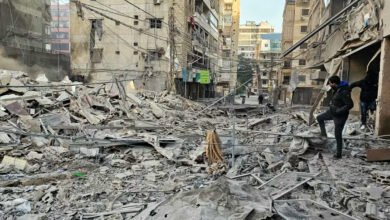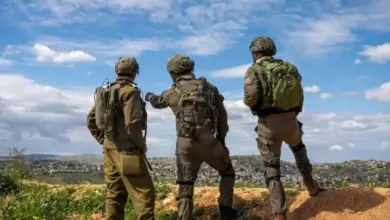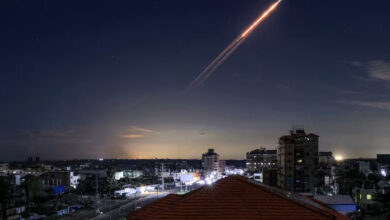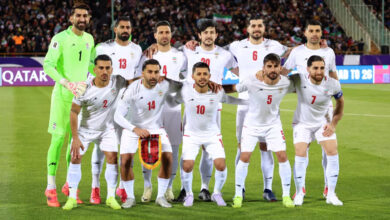Egypt hosted delegations from Hamas and Israel separately Monday to begin ironing out the details of a brokered truce that brought an end to Israel’s offensive on the Gaza Strip, which resulted in the death of 167 Palestinians and six Israelis.
Talks are being brokered by the Egyptian intelligence services, and aim to set up detailed terms pertaining to the implementation of the agreed tenets of the truce, which would involve a partial easing of the five-year siege on the strip. At the heart of this truce is Egypt’s role as a guarantor for Hamas to uphold the terms of the agreement.
Questions loom about whether the agreement is a win-win situation for all parties involved, while there are rising concerns over Israeli loss in the deal on one hand, and the weakening of the Palestinian plea on the other. Amid these questions, the quality of Egyptian mediation is being put to test.
Initial terms
Talks are in the nascent stage, says security strategist Tarek Fahmy, who attended some of the meetings Monday. There are attempts to reach an “agreement on a schedule to discuss the interpretation of the agreed upon points,” he tells Egypt Independent.
Paramount among them is whether border crossings are to be opened for passage of civilians and goods. However, the talks will also cover incremental trust-building measures that would allow for more freedom of movement and goods between the West Bank and Gaza.
At least three further meetings are expected to iron out more details, but what has already emerged involves partially removing the siege to allow Gazan fishermen and farmers more leeway. Fishermen will now be allowed to set out six nautical miles in the sea, as opposed to three, and farmers have also been given more leeway to cultivate, with their permitted access extended by 100 kilometers.
There are 11 points of discussion in the talks, and they also include defending the Israeli border with Gaza and allowing unarmed Hamas police to guard the border. Last Friday, a Palestinian was shot by Israeli border guards after thinking that he would approach it.
While there have been unsubstantiated reports circulating in the Egyptian press that the terms of the truce also mean the presence of US troops guarding the Egypt-Israel border, the reality is that there are simply ideas regarding Egypt accepting a security arrangement on the border with Israel. Fahmy says that “Israel might be a part of that,” but nothing concrete has been reached as of yet.
In the talks, there have also been attempts to create a protocol of not targeting civilians. Fahmy says an important request for Israel was that Hamas be able to rein in other groups in Gaza regarding firing rockets, and Hamas agreed to that stipulation.
The implementation of this tenet, however, remains questionable, after Israel started its whole offensive with the killing of Ahmed al-Jabari, Hamas’ military commander. Jabari is said to have been engineering a long-term truce between Hamas and Israel and was described as Israel’s security subcontractor in the strip, Israeli commentators say.
The different parties
Through this agreement, Egypt is emerging as the “guarantor of the truce, and would attempt to prohibit weapons reaching Hamas,” Abdel Alim Mohamed, Israeli affairs expert at Al-Ahram Center for Political and Strategic Studies, tells Egypt Independent.
“It is a similar arrangement to the past, where Egypt would attempt to rein in Hamas and pressure it and become the main mediator. This is a cementing of Egypt’s political role,” he says.
Mohamed says he does not see major differences between Muslim Brotherhood policy and former President Hosni Mubarak, “because regional strategic interest forces itself, and the Brotherhood prioritizes its relation with the US and, by extension, Israel.”
“It’s the exact same philosophy,” he adds.
However, for some analysts, the Egyptian role is different in the wake of President Mohamed Morsy’s rule. Morsy was said to be cautious to preserve relations with the US and Israel without selling out Hamas and its quest for resistance.
In his article for the London Review of Books, Adam Shatz writes that Israel cannot solely bank on Egypt to control Hamas just as it banked on the Mubarak regime, which was unconditionally ready to preserve its Western alliances. Shatz goes on to lament Israel’s overt reliance on authoritarian regimes in the region, which is currently contributing to its own isolation.
While there is a sentiment that Israel did not necessarily emerge victorious from the offensive, many think it primarily served as an important test.
“For Israel, this cease-fire means the rockets will stop,” says Mohamed, “but its offensive on Gaza was about more than that. It was to fire up the region ahead of another possible confrontation, probably with Hezbollah, because right before the attack on Gaza, Israel conducted a military simulation with the US in which it was attacked from four sides, possibly meaning Hamas, Hezbollah, Syria and Iran.”
Hezbollah is Lebanon’s powerful, pro-Hamas and pro-Iran political and military faction.
“It was also a trial for new Israeli weapons and defense systems,” Mohamed adds, “a trial run for further confrontation. And of course, there are the upcoming Israeli elections in January, like with the attack on Gaza in 2008. But Benjamin Netanyahu comes off as looking weaker than Ehud Olmert did back then, because Hamas was able to inflict more damage this time.”
As for Palestine, the strong Egypt-Hamas bond in the wake of the truce negotiations is seen as potentially leading to more insulation of Gaza from the West Bank and overall Palestinian issue.
The Palestinian National Authority, which controls the West Bank and its main faction, Fatah, has been excluded from all talks. Its ambassador in Cairo, Barakat al-Farra, tells Egypt Independent that he had no information on the talks, but was “hoping for a positive outcome.”
Separation between the West Bank and Gaza and the ensuing weakening of the Palestinian cause was recently further fueled by a visit of Qatar’s crown prince, Hamad bin Isa al-Khalifa, and his generous pledge for development support in the strip.
“The Qatari prince’s visit to Gaza and conversation with Hamas is only aggravating division. We still consider the Palestinian National Authority the official and legitimate representation of the Palestinian cause,” says Gamal Nasr, member of the Fidaa Party political bureau in Gaza.
Meanwhile, the celebration of Egypt’s position as a mediator by Israel and the West is described by some, like journalist Mahir Zeynalov, predominantly in Israel’s interests, because it makes Gaza an Egyptian responsibiity rather than Israeli one. As such, the argument goes, it contributes to weakening the Palestinian cause.
Additional reporting by Ahmed Deeb
This piece appears in Egypt Independent's weekly print edition.




